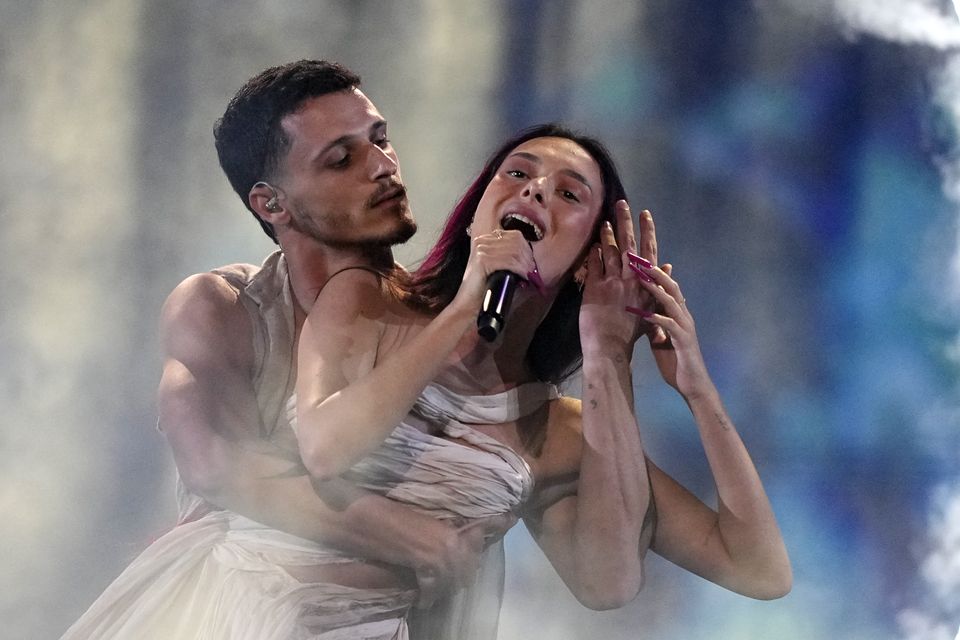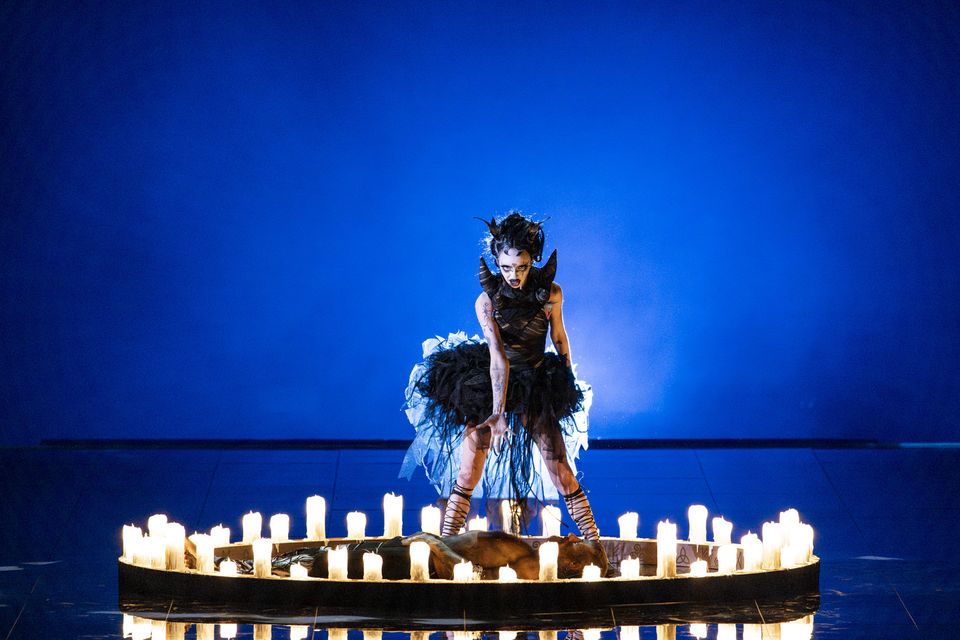Entering with the song Europapa, a tribute to his late parents, the 26-year-old Dutch rapper and singer had qualified for the grand final on Thursday evening at the Malmo Arena venue in Sweden.
The official page of the Netherlands’ Songfestival, which sends acts to Eurovision Song Contest, said the incident which led to Dutch act Joost Klein being disqualified followed the performer being filmed when he had “repeatedly indicated” that he did not want to be.
Joost Klein (Jessica Gow/TT News Agency/AP)
“An incident occurred after last Thursday’s performance. Against clearly made agreements, Joost was filmed when he had just gotten off stage and had to rush to the greenroom. At that moment, Joost repeatedly indicated that he did not want to be filmed. This wasn’t respected,” the statement said.
“This led to a threatening movement from Joost towards the camera. Joost did not touch the camera woman.
“This incident was reported, followed by an investigation by the EBU (European Broadcasting Union) and police.
“Yesterday and today we consulted extensively with the EBU and proposed several solutions. Nevertheless, the EBU has still decided to disqualify Joost Klein.”
Dutch broadcaster Avrotros said it was “very disappointed” with the outcome.
“Avrotros finds the penalty very heavy and disproportionate. We stand for good manners – let there be no misunderstanding about that – but in our view, an exclusion order is not proportional to this incident,” they said.
“We are very disappointed and upset for the millions of fans who were so excited for tonight.
“What Joost brought to the Netherlands and Europe shouldn’t have ended this way.”
A statement from the European Broadcasting Union (EBU) said: “The Dutch artist Joost Klein will not be competing in the Grand Final of this year’s Eurovision Song Contest.
“Swedish police have investigated a complaint made by a female member of the production crew after an incident following his performance in Thursday night’s Semi Final.
“While the legal process takes its course, it would not be appropriate for him to continue in the Contest.
“We would like to make it clear that, contrary to some media reports and social media speculation, this incident did not involve any other performer or delegation member.
“We maintain a zero-tolerance policy towards inappropriate behaviour at our event and are committed to providing a safe and secure working environment for all staff at the Contest.
Irish Eurovision fans on how they feel about their chances tonight and Joost getting kicked out
“In light of this, Joost Klein’s behaviour towards a team member is deemed in breach of Contest rules.
“The Grand Final of the 68th Eurovision Song Contest will now proceed with 25 participating songs.”
Klein missed two scheduled dress rehearsals on Friday while an investigation into an incident was carried out.
The grand final marks the end of this year’s Eurovision which has been mired in controversy.
We need your consent to load this Social Media content. We use a number of different Social Media outlets to manage extra content that can set cookies on your device and collect data about your activity.
On Friday, a statement from the European Broadcasting Union (EBU) said: “The investigation into the incident with the Dutch artist in this year’s Eurovision Song Contest is still ongoing.
“Discussions are also taking place between the EBU and Avrotros, the Dutch participating broadcaster.
“While the investigation continues, the EBU has decided that Joost Klein will not perform during dress rehearsal two of the competition, which is voted on by juries in the 37 participating countries.
“His performance from semi-final two will be used instead.”
The televised final at the Malmo Arena in Sweden will see acts from the big five countries – the UK, France, Spain, Germany and Italy – joined by reigning champions Sweden and 20 qualifying countries to perform in a bid to win the title.
Among the other acts who qualified during the semi-finals was Israeli contestant Eden Golan, whose participation amid the worsening humanitarian situation in Gaza has been a point of debate.
Her emotional song Hurricane was reworked from a previous track called October Rain, which was thought to reference the Hamas attacks on Israel that sparked the conflict.
More protests are planned for Saturday at the central square Stortorget, and pro-Palestinian demonstrators will walk across the city to Molleplasten.
Eden Golan of Israel performing the song Hurricane (Martin Meissner/AP)
Swedish activist Greta Thunberg, whose mother Malena Ernman represented Sweden at Eurovision in 2009, joined 10,000 to 12,000 pro-Palestinian protesters on the streets of Malmo calling for a boycott of the competition on Thursday.
On X, Ms Thunberg claimed Israel is trying to “artwash” Eurovision, referencing the use of artistic performance to distract from perceived negative actions by people, groups, governments or countries.
“We will not accept that a country currently committing genocide is allowed a platform to artwash themselves,” the 21-year-old said.
“The world cannot remain silent in a genocide.”
Israel denies genocide and maintains it has the right to defend itself after the attacks launched by Hamas in October saw more than 1,000 Israelis killed and kidnapped.
Prime Minister Benjamin Netanyahu said he was “proud” of Golan for participating in the competition, while UK Prime Minister Rishi Sunak hit out at the demonstrations, saying they were “wrong” and “unfair”, according to a spokesperson.
UK contestant Olly Alexander is hoping to impress in the final with his song Dizzy, featuring an upside-down dressing room staging and cameras rotating to create a spinning feel.
Irish entrant Bambie Thug rehearsing Doomsday Blue (EBU/Sarah-Louise Bennett/PA)
Irish entry Bambie Thug also landed a place in the grand final, which makes them the first Irish finalist since 2018 after a vote for their performance of Doomsday Blue.
Also in the final are Swedish duo Marcus and Martinus with their track Unforgettable.
Sweden is hosting the competition after the victory of its singer Loreen in Liverpool last year, and it is also the 50-year anniversary of Abba giving Sweden its first win with Waterloo.





